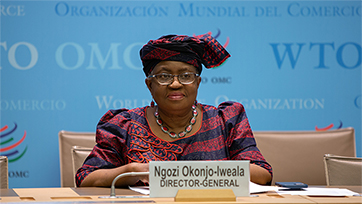environment
Fossil fuel subsidy reform *
The Fossil Fuel Subsidy Reform (FFSR) initiative seeks to rationalize and phase out inefficient fossil fuel subsidies that encourage wasteful consumption and encourages WTO members to share information and experiences to advance discussions at the WTO. A ministerial statement launching the initiative was issued by a group of WTO members in December 2021.
See also:
- WTO Trade and environment
- Other WTO environmental initiatives:
The FFSR initiative at MC13
MC13 outcomes
- Ministerial Statement on Fossil Fuel Subsidies – WT/MIN(24)/19
- FFSR Work Plan
- List of sample questions for use in Trade Policy Reviews
News
Participation
Coordinated by New Zealand, the FFSR initiative is open to all WTO members. It currently has WTO members as co-sponsors. The initiative actively seeks the involvement of stakeholders from the private sector, civil society, international organizations and academia, who support discussions through technical expertise, experience-sharing and transparency about their activities.
Meetings
24 November
- Convening Notice (including draft agenda): INF/TE/FFSR/CN/4
- Summary Report of 24 November meeting: INF/TE/FFSR/R/2
18 July
- Convening Notice (including draft agenda): 4INF/TE/FFSR/CN/3
- Presentation by WTO Secretariat - Classification of FFS measures
- Presentation by WTO Secretariat - Information and questions on FFS in TPRs
- Presentation by WTO Secretariat - Temporary FFS and phase-out best practices
- Presentation by QUNO - Classification of FFS
15 February
- Convening Notice (including draft agenda): INF/TE/FFSR/CN/2/Rev.1
- Presentation by IISD on Economic and Social Impact of FFS
- Presentation by CCA on Clean cooking for energy security and development
- Presentation by EU DG CLIMA on Social Climate Fund
- Presentation by UNCTAD on Development Dimension of FFSR
- Presentation by UNDP on Development Context of FFSR
- Presentation by Costa Rica on Climate Action in Costa Rica — Policies to Practice
- Presentation by Costa Rica — Notes to read alongside Powerpoint slides
- Presentation by The Policy Practice on Ending Fossil Fuel Subsidies book
3 October
- Convening Notice (including draft agenda): INF/TE/FFSR/CN/1
- Aide-mémoire by the Coordinator: INF/TE/FFSR/R/1
- Presentation by IISD on IISD's Policy Brief and Stocktake of International Efforts Related to FFSR
- Presentation by WTO Secretariat on the report “Subsidies, Trade, and International Cooperation” prepared jointly by the IMF, OECD, World Bank, and WTO
- Presentation by UNEP on reporting under Sustainable Development Goal Target 12.c
- Presentation by QUNO on FFS
Key documents
FFSR Ministerial Statement, 10 June 2022 |
WT/MIN(21)/9/Rev.2 (Revision of 14 December 2021 statement: WT/MIN(21)/9/Rev.1) |
FFSR Work Plan 2022-23, 10 June 2022 |
WT/MIN(22)/8 |
Objective of the initiative
Building on efforts from the 11th Ministerial Conference (MC11) in December 2017, a Ministerial Statement was issued by a group of WTO members in December 2021 (WT/MIN(21)/9/Rev.1). It was subsequently revised in June 2022 (WT/MIN(21)/9/Rev.2).
The statement highlights the need to elaborate concrete options for rationalizing and phasing out inefficient fossil fuel subsidies by sharing information and experiences among members ahead of the 13th Ministerial Conference (MC13). The statement pledges to take into account the specific needs and conditions of developing countries and to minimize the possible adverse impacts on their development in a manner that protects the poor and the affected communities.
The FFSR initiative is part of broader discussions at the international level through which WTO members aim to address issues of inefficient fossil fuel subsidies that encourage wasteful consumption. These broader discussions include UN Sustainable Development Goal 12 (c) of the 2030 Agenda, the G20, the G7, Asia-Pacific Economic Cooperation, the Agreement on Climate Change, Trade and Sustainability, the V20 Group of Finance Ministers from climate-vulnerable economies, the Paris Agreement on Climate Change and the Addis Ababa Action Agenda on Financing for Development.
State of play
The FFSR co-sponsors adopted a Work Plan (WT/MIN(22)/8) for the year 2022-23 at the 12th Ministerial Conference in June 2022. The Work Plan sets up a forum to take stock of international efforts on FFSR, to consider the development and social aspects of FFSR and to discuss next steps towards MC13. Seeking to meet three times from 2022 to 2023, the forum will map other relevant international, regional and domestic initiatives and highlight the importance of coordinating work under the different processes while avoiding duplication of work.
* The documents on this page relate to an initiative among a group of WTO members and are not part of a multilaterally agreed WTO process. Back to text
Share
Launch event of FFSR Ministerial Statement, 15 December 2021

![]() This [FFSR] statement cites inefficient fossil fuel subsidies as encouraging wasteful consumption and disadvantaging renewable energy. It notes that such subsidies have continued to steadily increase in the past decade and were estimated at approximately USD 500 billion in 2019.
This [FFSR] statement cites inefficient fossil fuel subsidies as encouraging wasteful consumption and disadvantaging renewable energy. It notes that such subsidies have continued to steadily increase in the past decade and were estimated at approximately USD 500 billion in 2019.![]()
Dr Ngozi Okonjo-Iweala, WTO Director-General
15 December 2021
Problems viewing this page? If so, please contact [email protected] giving details of the operating system and web browser you are using.